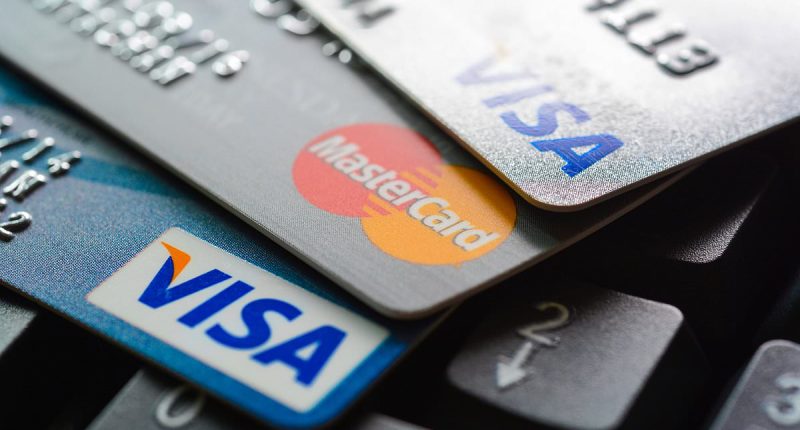Share this @internewscast.com
Retail giants including Walmart and Amazon are reportedly exploring a bold plan to bypass traditional banks — by creating their own currency.
The move to create their a so-capped stablecoin would allow the companies to handle payments with a form of cryptocurrency pegged to the US dollar.
Walmart and Amazon could then cut out middlemen like Visa, Mastercard, and major financial institutions.
Transitioning could potentially save retailers billions each year in card processing and interchange fees. However, experts caution that it might spark a crisis within the banking sector.
Neil Saunders, managing director of retail at GlobalData, informed the Daily Mail that ‘Big retailers shifting away from traditional payment systems would significantly impact banks and payment providers.’
‘Banks and credit card companies generate substantial profits from interchange fees, which is precisely why retailers are interested—they aim to lower these expenses.’
Other companies are looking at a stablecoin too, including Expedia and airlines, according to the report by The Wall Street Journal.
Any innovation currently depends on a bill, called the Genius Act, which would establish a regulatory framework for stablecoin.

Walmart is reportedly considering making major changes to its payments, in a departure from the traditional financial system
The cryptocurrency legislation wouldn’t just enable companies to launch stablecoins — it’s also key to convincing consumers the new payment system is safe.
There is a level of skepticism around the safety of digital assets and currencies, including stablecoin.
The bill still needs to clear the Senate and the House if any major changes are to become a reality.
Stablecoins could allow retailers to avoid traditional payment systems which cost them billions of dollars in fees every year, including interchange fees which they pay when shoppers make purchases using their debit or credit card.
They could also offer merchants a quicker process for receiving proceeds from sales. Currently, payments can sometimes take days to settle.
It would offer an alternative to the card-based system which is dominated by Visa and Mastercard.
Interchange fees, or ‘swipe’ fees, for Visa and Mastercard totaled $111.2 billion in 2024, up from $100 billion the year before, according to the Merchants Payments Coalition.
The group of retailers has been meeting with lawmakers in recent months to push for the Genius Act to be made law. They believe that a regulatory framework for stablecoin could help end the ‘duopoly’ of Visa and Mastercard.

A stablecoin is a form of cryptocurrency which is designed to maintain a stable value by being pegged to a fixed asset such as the US dollar

‘Big retailers moving away from traditional payment systems would be a huge blow for banks and payment providers,’ said Neil Saunders, managing director of retail at GlobalData

Interchange fees, or ‘swipe’ fees, for Visa and Mastercard totaled $111.2 billion in 2024, up from $100 billion the year before, according to the Merchants Payments Coalition

The shift would upend the existing system, causing a potential ‘crisis’ for major banks, experts are warning (Pictured: JPMorgan Chase CEO Jamie Dimon)
‘More choice and more innovation is a good thing,’ Doug Kantor, member of the Merchants Payments Coalition’s executive committee, told the Daily Mail.
‘There has been no innovation in 40 years.’
For Kantor, stablecoins are a positive step as they mean more competition for Visa and Mastercard, and they could make payments more efficient and more convenient for merchants and customers.
However he notes that there are many things that need to happen before stablecoin payments could become a reality in stores across the US.
Not only is regulation needed for consumers so they can see it is a safe payment method, but Visa or Mastercard could potentially take control of or kill any stablecoin venture in order to maintain their dominance, he said.
‘They have an incentive to stop innovation,’ Kantor explained.
There could also be difficulties in convincing consumers to adopt new technology, or traditional banks could simply adapt to the changes, said Bankrate financial analyst Stephen Kates.
‘A large shift from the traditional banking and payment systems would create a huge crisis for the mainstays of the industry, such as JPMorgan Chase or Bank of America in banking, or Visa and Mastercard in payments,’ he told the Daily Mail.
‘However, at this early stage, it is easy to assume that the banks and payment processors could shift their businesses to accommodate the changes in merchant and consumer behavior.
‘However, it is not yet clear how big of a move there would truly be. The introduction of pay-by-bank options at retailers has not meaningfully reduced credit card volumes, given the entrenched use of cards and the ease and comfort of the swipe.’

‘More choice and more innovation is a good thing,’ Doug Kantor, member of the Merchants Payments Coalition’s executive committee, told the Daily Mail

Amazon’s efforts to integrate stablecoins are still in the early stages, a person familiar with the discussions told The Wall Street Journal

There could also be difficulties in convincing consumers to adopt new technology, or traditional banks could adapt, said Bankrate Financial Analyst Stephen Kates
He said if retailers made a forcible move towards card alternatives, such as a store-brand or third-party issued stablecoin, it would most likely be used primarily online, where there are already many competing payment options, such as PayPal or Buy-Now-Pay-Later.
‘Credit card companies and banks aren’t yet challenged by these new entrants and would most likely not be immediately challenged by stablecoins either,’ he continued.
Whether or not these changes would be good for the consumer remains to be seen, Kates added.
Third-party institutions like Visa or Mastercard offer proven security and muscle for consumers who are victims of fraud, he said, but stablecoins offer none of this.
‘While companies like Walmart or Amazon have the financial resources to stand behind any future branded stablecoins, there are open questions about how stablecoin use or misuse might impact the stability of the broader financial system.
‘Stablecoins, similar to other non-bank, non-FDIC insured products like money markets, are susceptible to runs, which can become panic-inducing for consumers and financial institutions when they occur.’
Plus, it is unlikely to mean that lower costs from reduced interchange fees are passed down to the consumer.
‘It’s possible that the overall cost of goods might fall slightly, but it is more likely that there would be a discount for consumers who use it similar to the cash discount seen at certain retailers,’ said Kates.
Amazon’s efforts to integrate stablecoins are still in the early stages, a person familiar with the discussions told The Wall Street Journal, and some of the talks have centered on having the company’s own coin for online purchases.
Walmart has lobbied for adding a separate amendment to the Genius Act, people familiar with the matter told the outlet.
It would introduce more competition in the credit-card sector.
Walmart and Amazon did not immediately respond to the Daily Mail’s request for comment.

















